Case Study: How This SMB in the Healthcare Industry Achieved a 47% Conversion Rate
The ease of access to digital marketing has good news and bad news. The bad news is that PPC campaigns are costing more and performing worse than ever. But the good news is that people are more likely to trust their friends and family than paid ads, and with easy-to-use referral software, running a referral program has become easier than ever.
Referral marketing statistics show that 76% of customers are more than happy to recommend a business to their friends after a positive experience and this is exactly why referral programs that leverage the power of positive word of mouth can be incredibly effective for businesses of all kinds.
This healthcare SMB proves that referrals aren’t just for the big fish out there. In fact, they achieved a 47% conversion rate!
🏛️ Niche: Healthcare
💵 Business type: B2C
🌎 Location: US
🧑💼 Size of the company: 15+ employees
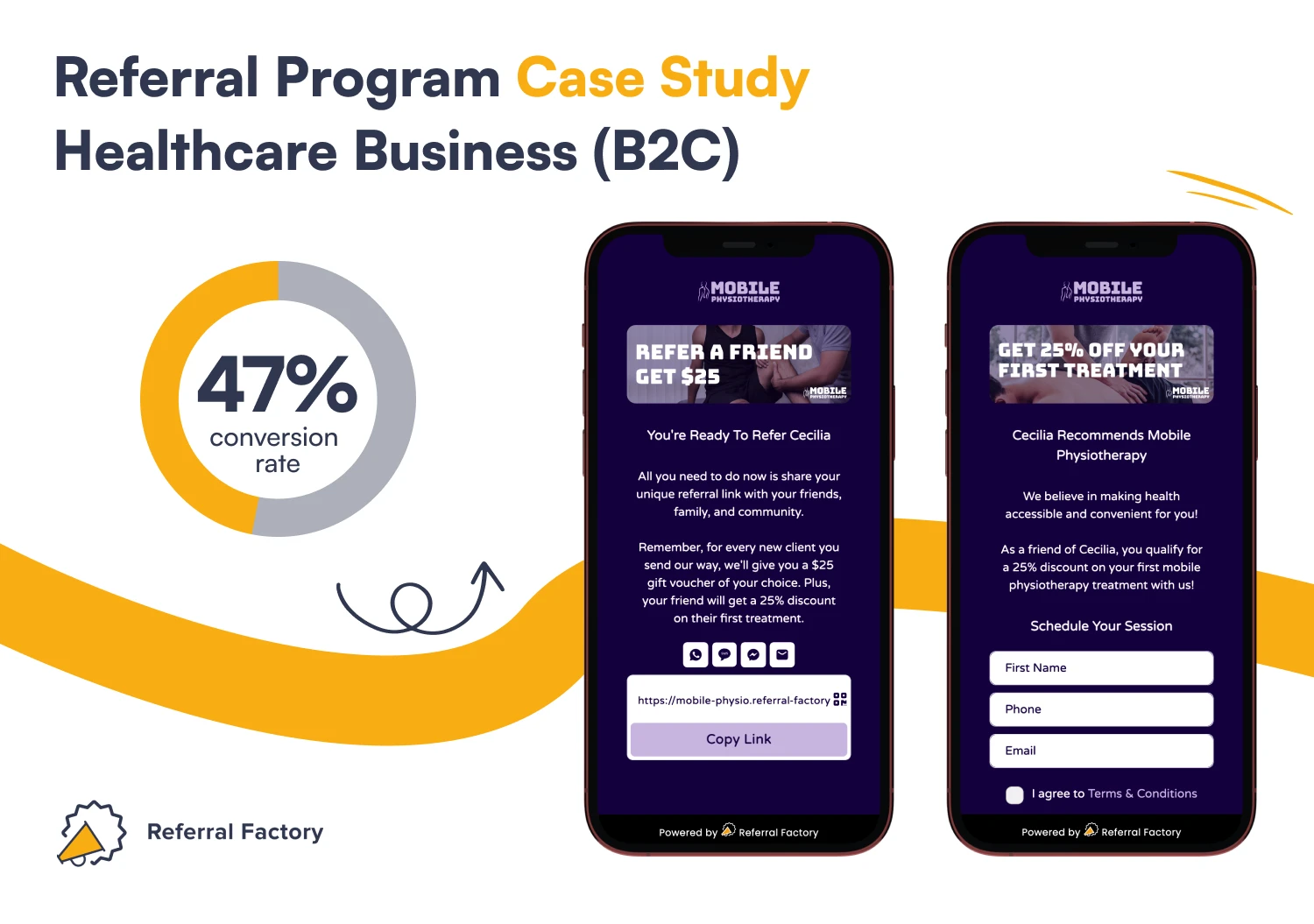
During the months after the pandemic hit, this mobile physiotherapy clinic noticed a big demand for home treatment. So, they decided to focus more on providing physiotherapy services to their clients at home rather than having them come to a clinic. Their goal? To give top-notch treatment while making it super convenient for their clients.
Right from the start of this service, they saw how valuable referrals were. This was the strategy that really promised to work in their unique circumstances. Their loyal clients were already recommending a clinic to others without any prompting. To make the most of this, the company set up a formal referral program.
This referral program has been a huge success, showing that referrals aren’t just for big companies or online stores. Even small business referral programs can get amazing results if they’re carefully planned.
Table of Contents
Their Challenges (What Led Them To Referrals?)
This is the case where the business understood the power of referrals but needed assistance in managing the process due to the following challenges.
👉 Challenges:
- Limited in-house marketing expertise. This SMB has a small administrative team that manages all its marketing. So, while they felt excited about all the referrals they were getting from existing clients, they didn’t know exactly where to start with a referral marketing strategy.
- Unfamiliarity with digital marketing tools. They were also worried that tracking referrals would be a huge administrative nightmare, and people would complain if they lost track of who referred whom. This was especially concerning given the limited technical expertise in the company – their IT needs were all outsourced.
- Difficulty attracting the right target market. They knew that recommendations and word of mouth were the best way to target the right audience for their mobile physiotherapy services, especially as it was a new concept for many of their older clients. But they didn’t know how to manage that process.
How A Referral Program Helped Them Overcome These Challenges
They came across Referral Factory while searching for referral program templates and booked a demo to see if the software was as easy to use as it seemed. As a result:
- They found they could effortlessly build and manage a referral program themselves using Referral Factory’s plug-and-play solution.
- They were also grateful for the multitude of resources like templates built into the system.
Within a matter of weeks, they had a professional-looking referral program up and running. They were able to introduce it to their clients via email and in face-to-face sessions. This meant that they could target an older generation of their clientele in person but still track referrals via the referral links generated on Referral Factory.
How Their Referral Program Works
This double-sided referral program works via referral links. Referrers can join by signing up for their unique referral link, which they can then easily share with their friends and family.
🎁 What does the person referring (a current client) get?
This campaign encourages participants to spread the word about the business with a $25 gift card for the person referring.
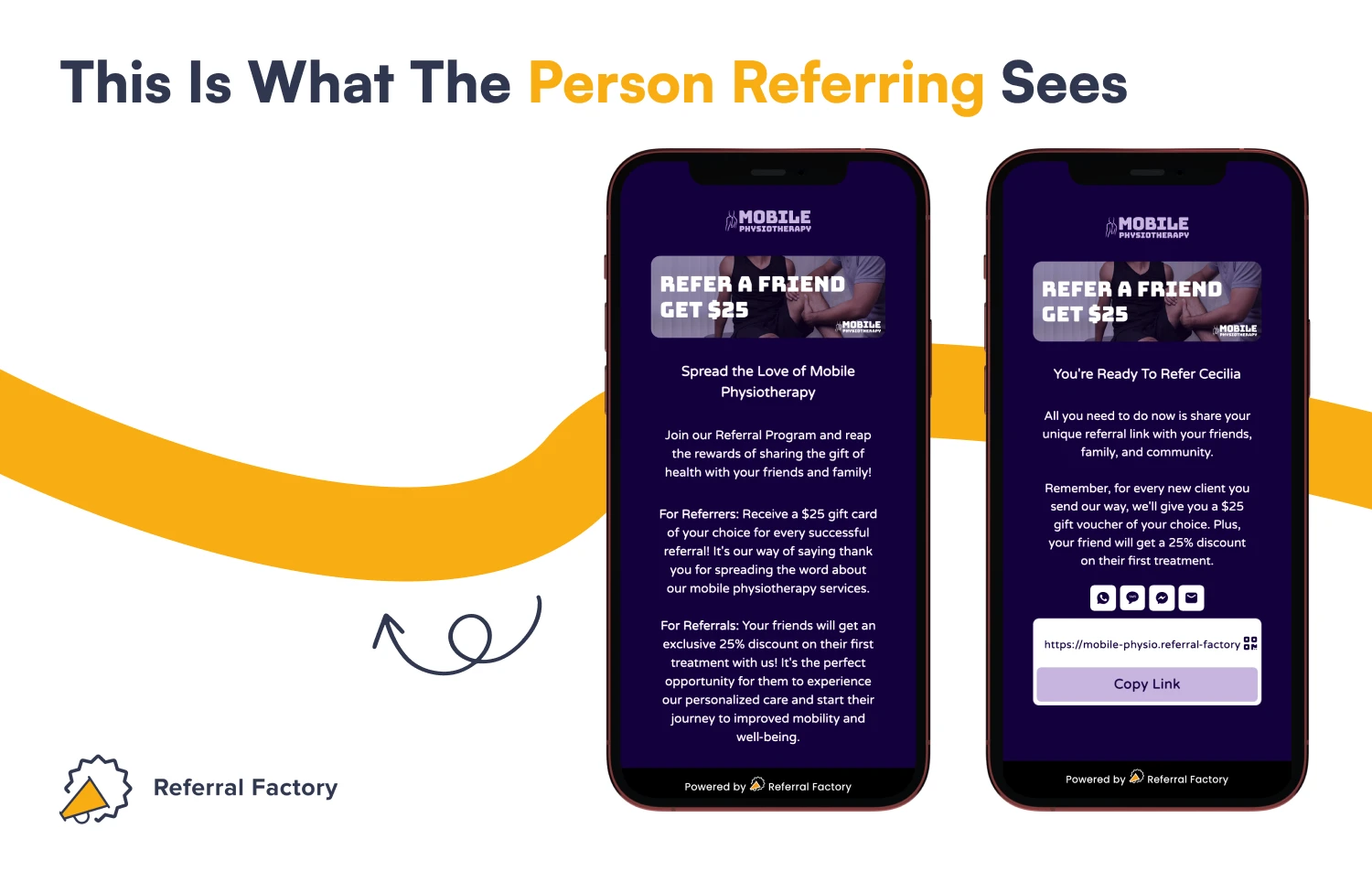
🎁 What does the person invited (a new client) get?
When someone clicks on a link, they are taken to a personalized invitation page where they enter their details, schedule their first appointment, and claim their 25% discount.
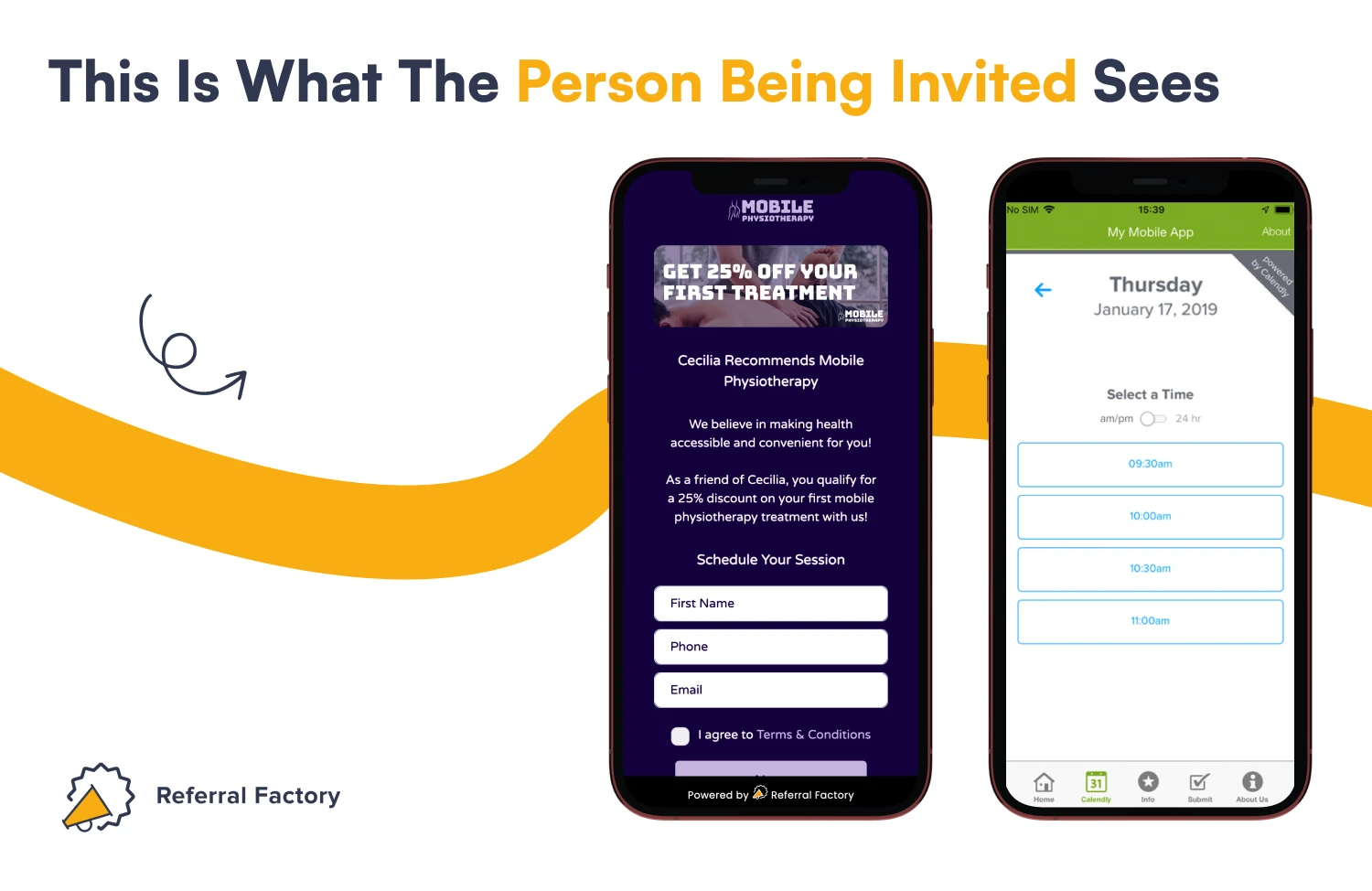
How The Company Promotes Its Referral Program
As this healthcare business doesn’t have a dedicated marketing team, they chose a very straightforward approach to promotion:
- Using email, text & social media. The referral program was announced via text and email and posted to all their social media channels. Automated reminder emails were also set up to fire once every 6 weeks to people who registered for a referral link.
Inviting people in person via a QR code. To make sure they asked for referrals at exactly the right time, this SMB printed out their referral program join link as a QR code on a beautifully designed flyer. When people scanned the code, they could sign up for a unique referral link.
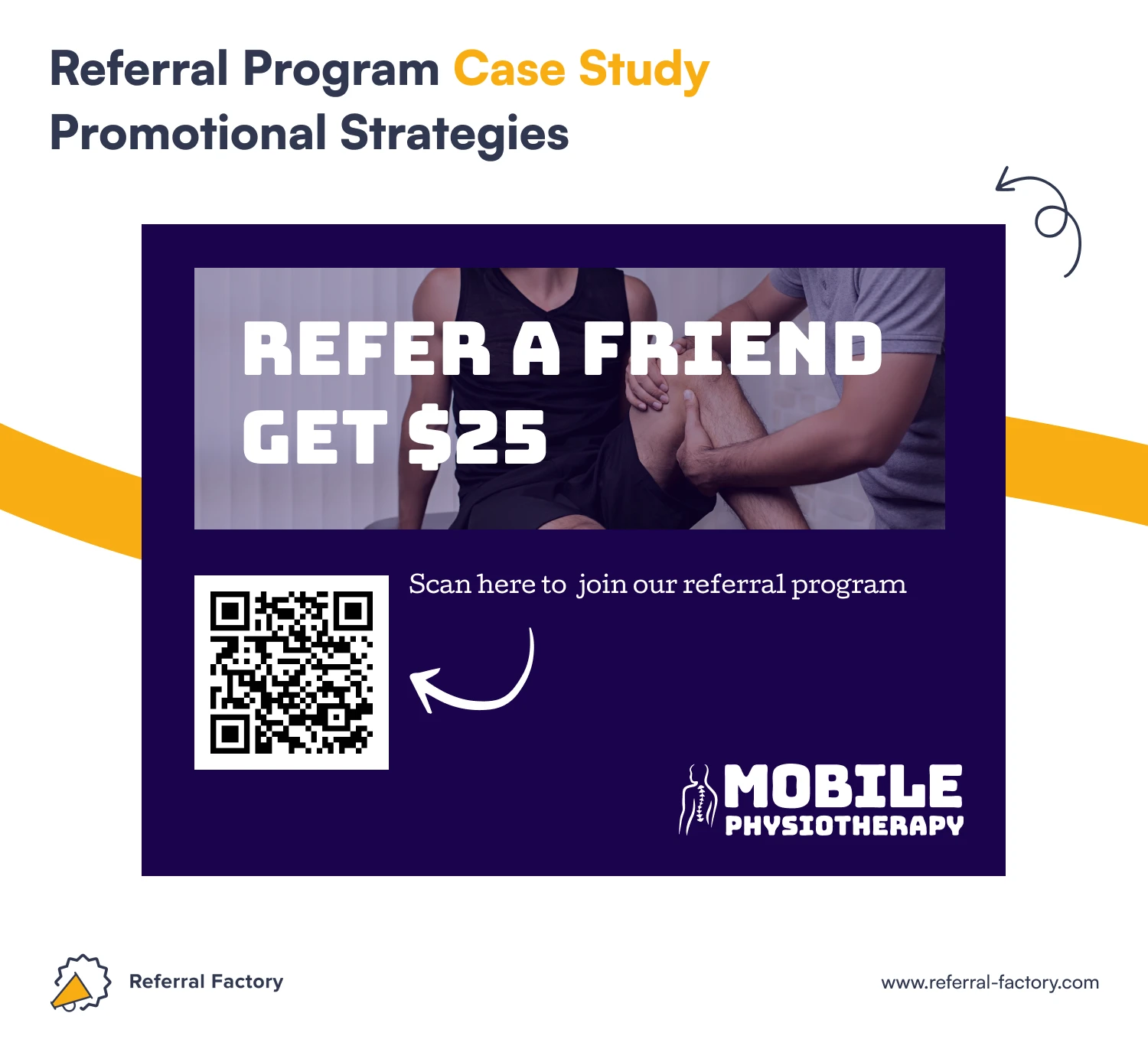
Final Results & Metrics
For an SMB with no dedicated marketing team, 834 new leads via a referral program is a pretty impressive number! What’s more astonishing is that almost half of those leads converted (47%), claiming their discount and booking a treatment.
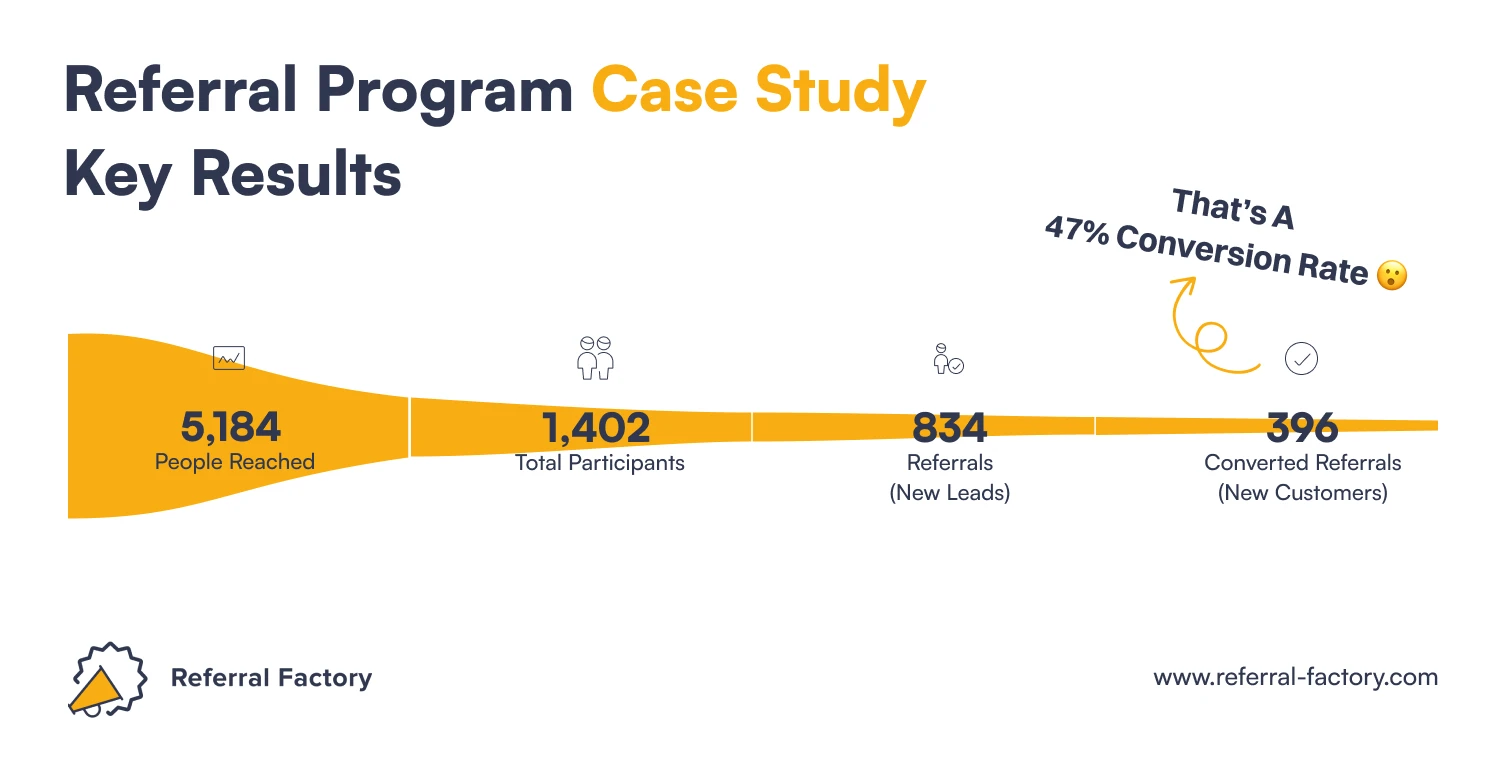
A total of 1,402 people have participated in the referral program, with many referrers inviting as many as 5 friends each! This high engagement rate is explained by the social proof that comes from getting your first referral: the moment you start planning what to spend that referral reward on, you begin wondering who else you could refer!
Client Testimonial
“We were very nervous about trying referral software as we don’t have any in-house IT services, but Referral Factory was so intuitive, and we were really impressed with how easy it was to build our referral program.”
— Senior Administrator
“I like that Referral Factory helps us reward our own clients with a marketing budget we would have probably spent on Google Ads or something. It feels great to know that our very own community is behind the growth of our business. And the fact that we can manage our referral program ourselves has saved us a lot of money.”
— Founder
Conclusion
Once you choose a plug-and-play referral software, you don’t necessarily need a marketing team to manage your campaigns. And the results of this health and beauty referral program proves it. They’ve managed to tap into the power of word-of-mouth and get more clients than they could have imagined before starting with referrals.




